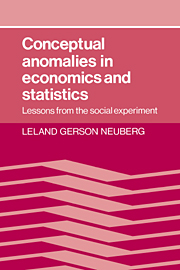Conclusion: Some possible barriers to controlled social experiments as science
Published online by Cambridge University Press: 16 February 2010
Summary
Introduction: The difficulties that may be barriers
From Parts I and II to the Conclusion
We considered recent social “experiments,” such as the four income maintenance studies, as experiments in two senses. In Part I we viewed them as the sort of random-assignment experiments that R. A. Fisher introduced into agronomy in the 1920s. In Part II we considered them as the kind of tests of hypotheses-deduced-from-theory that Karl Popper argued, beginning in the 1930s, were the hallmark of physics and science more generally. The first sense of experiment is that of what one could call an empiricist vision of science, whereas the second is that of what one might label a rationalist vision of science. We argued that these visions of science were problematic accounts of agronomy and physics experiments, that the problems could be catalogued, and that reconstructions of recent social experiments in accordance with the two visions of science possessed the same catalogue of problems and then some. If the social experiments were not science, we argued, the reasons they were not might be found in the “and then some” portion of their reconstructions' catalogue of problems.
At the base of the empiricist vision of science, we argued, was the drive to know the object of inquiry on the basis of observation alone.
- Type
- Chapter
- Information
- Conceptual Anomalies in Economics and StatisticsLessons from the Social Experiment, pp. 287 - 316Publisher: Cambridge University PressPrint publication year: 1989



